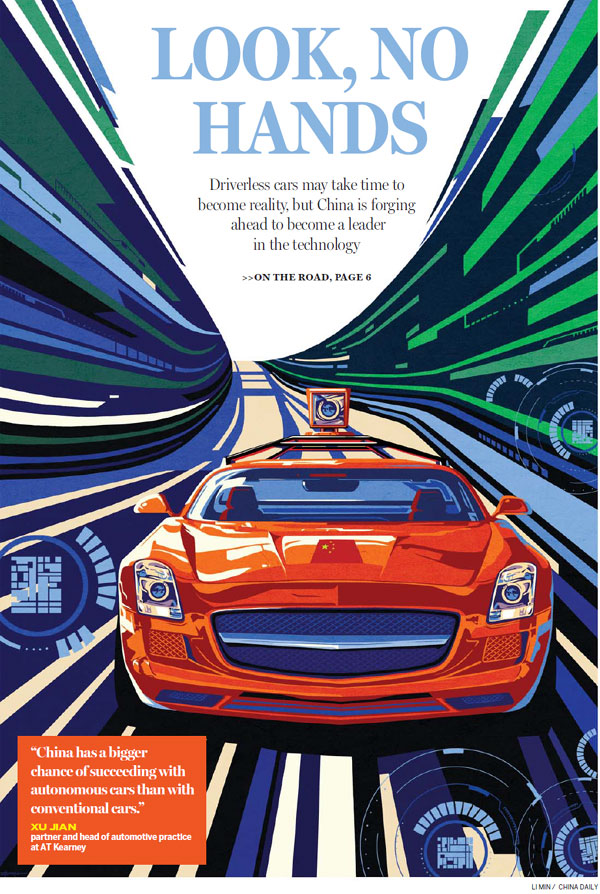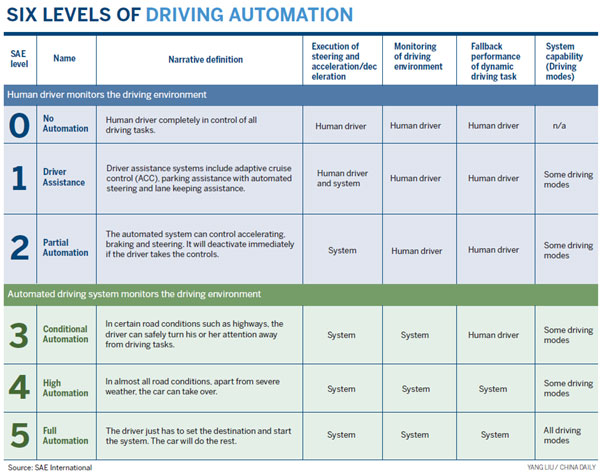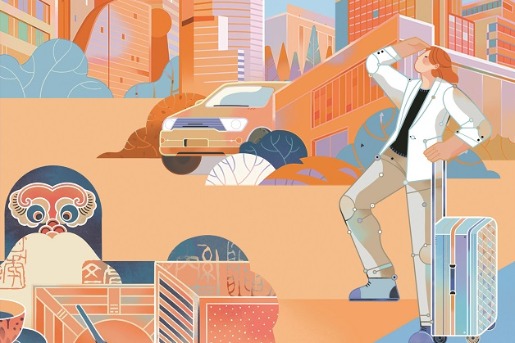Look, no hands

Driverless cars may take time to become reality, but China is forging ahead to become a leader in the technology
In a country where it is a challenge for a pedestrian to avoid being run over by a tuk-tuk, cart or cyclist, China seems an unlikely market for driverless cars.
It would have to be a highly intelligent system to cope with much of the existing mayhem.


| Changan's vehicle attracts attention at the Beijing Auto Show 2016. Provided to China Daily |
Yet China is set to be the world's leading market for the new technology with one-fourth of the 12 million autonomous cars sold globally by 2030 expected to be on its roads, according to Boston Consulting Group.
The government has made it a high priority to achieve success in both robotics and automotive technology in its Made in China 2025 plan published last year.
Starting from almost nowhere in the 1980s, China's automotive industry has struggled to compete with many of the established Western car giants, some of which were there at the birth of the internal combustion engine 130 years ago, and with Asian rivals in Japan and South Korea.
The hope is that China will finally make a breakthrough in the automotive sector with both new energy cars and driverless technology over the next decade.
There has been progress. Beijing Benz Automotive Co, the joint venture between Beijing Automotive Industry Holding Corporation and Daimler Benz, started making on June 15 the Mercedes-Benz E-Class L in Beijing, which is set to be the most advanced autonomous car on the market when it is launched this autumn.
Changan, the Chongqing-based manufacturer, tested out two of its driverless cars, sending them on a 2,000-kilometer journey from its Southwest China base to Beijing in time for the Beijing Auto Show in April.
Volvo, which is owned by Hangzhou-based Zhejiang Geely Holdings, announced in April that it is going to put 100 self-driving Volvos on the public roads in Sweden by 2017.
One of the most active players in the new technology has been China's internet search engine giant Baidu, which is in partnership with BMW to produce an autonomous car.
Baidu and Alibaba have links with other Chinese manufacturers, providing them with systems that will enable cars to self-drive.
Xu Jian, partner and head of automotive practice at management consultants AT Kearney, based in Shanghai, says it is the power of these internet giants that is giving China an advantage in autonomous cars.
"China has a bigger chance of succeeding with autonomous cars than with conventional cars. This technology requires not just conventional automotive expertise, but the software and IT," he says.
"China has some of the leading IT players in the world such as Baidu, Huawei and Alibaba."
Xu says autonomous technology is being developed at a time when China is developing other advantages in the automotive sector, seen in the success in developing a new generation of engines that meet Euro 6 emission standards.
"In the past, China's motor manufacturers were held back because they had to develop by forging partnerships with foreign car companies. There was always a limit on how much technology these companies wanted to share with their Chinese partners.
"What has changed, particularly over the past 10 years, is that Chinese companies now have the money, which they did not have before, to go out and buy engineering expertise in Europe and the United States, and this is beginning to produce results."
There was certainly interest when Changan tested its driverless cars on the highway from Chongqing to Beijing over five days.
During the journey, which attracted a lot of media attention, the cars successfully managed to change lanes, overtake, keep a safe distance from other vehicles and, importantly, end up at their final destination without incident.
Drivers were still needed in some complicated driving conditions. The cars were confused when they faced trucks ahead of them that were wider than the road markings, and when they went into dark tunnels, which made them slow down.
Li Yusheng, chief engineer of the project, was happy with the trial, and the company is still on track to launch the cars for commercial use in 2018. It wants a mass-produced car that will be capable of dealing with difficult urban driving conditions by 2025.
"The cars ran up to 120 km/h on the highway, and adapted to the changing road surface. The user interface could still be more user-friendly for passengers," Li said in an interview with Xinhua News Agency.
It was Google that first signaled to the world that the future of the automotive industry might no longer just lie with car companies when it produced a robotic car in 2005 in conjunction with the Stanford Artificial Intelligence Laboratory.
The internet giant has gone on to develop cars capable of doing around 40 km/h.
Driverless cars, however, merge standard automotive technology with other technologies such as sensory and mapping technologies.
The move to autonomous vehicles is more an evolution than some sudden step-up to fully automated vehicles. A number of cars already have autonomous steering capability and the ability to drive into a parking space automatically.
There are five levels of automated vehicle, according to the US Society of Automotive Engineers. In level one, there is some help with either steering or acceleration; in level two, there is partial automation; in level three, conditional automation, where the system takes over most of the driving tasks but the human driver is always in fall back control; in level four, high automation; and in level five, full automation, where the car itself is in full control.
Zhu Huarong, president of Changan, is confident China will be at the vanguard of the technology.
"I see a better future for the self-driving cars than the new energy ones, at least I see it progressing. The first stage of self-driving is already realized, and it won't be a problem for the second stage to be enabled in 2017 or 2018, and it is highly possible to achieve the third stage by 2020 and the fourth by 2025," he told 21st Century Business Herald.
It is not necessarily the technology that will hold back the development of autonomous cars but the legal issues that will have implications for the way cars are insured.
Now, in the event of an accident, the driver is often held responsible. But if the car has no driver, does the fault then lie with the car manufacturer?
The regulatory framework might prove easier in China. Baidu has a five-year agreement with Wuhu in the eastern province of Anhui to gradually introduce the company's autonomous cars, buses and vans on certain roads and specific zones. Google, on the other hand, has not even been able to convince regulators in its home state of California that its cars are safe on the roads.
Xu Gang with the automotive team of Boston Consulting Group believes this is a real problem, with a wide range of legal and insurance issues.
"There is a responsibility issue. The insurance industry is looking at this and starting to get on board. It requires a lot of parties to work together. I think on this issue China is not that much further ahead than others," he says.
Xu at AT Kearney disagrees, however. He believes a solution will be found so it won't hold back any of the technological advances.
"It will be 20 to 25 years before fully autonomous cars are on the roads, and that is plenty of time to sort out all the legal and other issues. The insurance companies are working on this already," he says.
Zhu Huarong , chief executive officer of Great Wall Motors, based in Baoding, Hebei province, agrees the problems can be overcome.
"Although automatic driving involves many problems, such as laws and regulations in terms of how traffic accidents will be dealt with, I think autonomous vehicle technology is a great breakthrough that will transform society. If it is fully realized, cities in China will not have the same traffic congestion problems," he told 21st Century Business Herald.
Whether China will become a leader in autonomous vehicles remains to be seen. With the technology still developing, the country is a melting pot of cross-collaboration between established car manufacturers and technology companies.
Apart from Baidu, LeAuto - a subsidiary of Leshi Internet Information and Technology - unveiled the LeSEE, its concept driverless vehicle, on April 20.
Xu at AT Kearney believes China is an exciting market for the technology, but it is difficult to say whether it will take a lead.
"You now have an ecosystem where not only car makers are collaborating with technology companies, but also working with each other. Chinese companies are also working with foreign companies," he says.
"What you are seeing is what is happening in other industries also. Samsung and Apple might be competitors, but Samsung is also a supplier of components to Apple. You have got car companies and technology companies both working together and competing with each other."
Cheng Yingqi contributed to this story.
State of play
Chinese car makers' moves in autonomous vehicles
Changan: Expected to launch its first model in 2018. By 2025, aims to mass- produce a car that will cope with China's difficult urban driving conditions.
Beijing Automotive Industry Holding Corp: Started production on June 15 of the Mercedes-Benz E-Class L in Beijing, which is being produced by its joint venture with Daimler Benz.
BYD: Focusing on new energy vehicles and has not announced any moves in the autonomous vehicles.
Lifan: Set to launch a low-speed autonomous vehicle in June 2017.
Great Wall Motors: Plans to launch a model by 2020.
Dongfeng Motor Corp: Working in partnership with Chinese telecommunications company Huawei to produce an autonomous vehicle.
Zhejiang Geely Holdings: The owner of Volvo announced in April that it is going to put 100 self-driving Volvos on public roads in Sweden by 2017.
GAC: Currently doing research and development with the Chinese Academy of Sciences into autonomous vehicle technology.
Shanghai Automotive Industry Corp: Working with Baidu to produce an autonomous car for all conditions within 10 years.
FAW Group Corp: Expects that half of its products will be mostly autonomous by 2025.
| An employee works on an assembly line producing Mercedes-Benz cars at a factory of Beijing Benz Automotive Co in Beijing. The automaker has begun making the Mercedes-Benz E-Class L, which is capable of automated lane-changing and steering. Provided to China Daily |
(China Daily European Weekly 06/24/2016 page1)
Today's Top News
- 2025 in review: A year of shifting horizons
- Decade-plus high for key A-share index
- Spirit of the Long March guides nation for socialist modernization
- China curbs dual-use item exports to Japan
- UN members denounce US attack
- US attacks on Venezuela violate international law
































